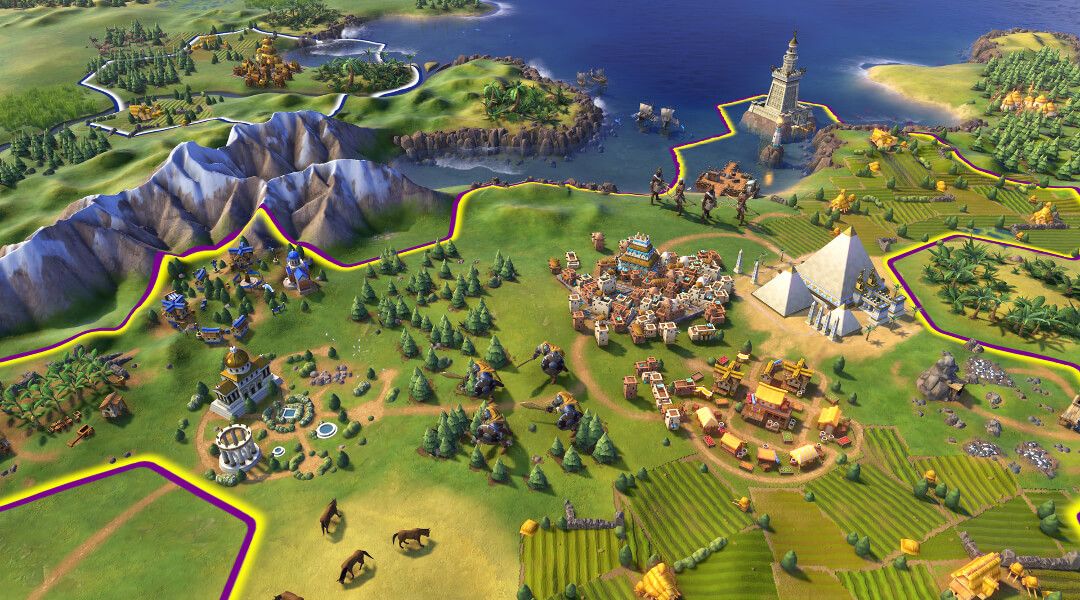Whether you're completely new to the series or just a little bit rusty, here's how to hit the ground running in Sid Meier's Civilization VI.
Over the past twenty-five years, Sid Meier's Civilization has become one of the most well-loved series in all of gaming, and for good reason. These games can easily swallow up an evening, but they can be rather intimidating if you're starting afresh.
Like its predecessors, this year's Civilization 6 is a very complicated game — even experts will have to spend some time getting to grips with the new implementation of religion, and the newly introduced districts mechanic. For any novices looking to make this their first Civilization experience, the best advice is to dive in and learn as you go.
That said, there's one warning to be laid down beforehand: make sure to keep one eye on the clock as you're playing Civilization, because it's very easy to get caught up in the "one more turn" mentality...
Before You Begin
Before players start their first game of Civilization, it's important for them to realize that they're not going to grasp every mechanic on their first playthrough. Trying to understand everything at once is a recipe for failure — instead, focus on certain systems and de-prioritize others.
Most players won't see their first game through to completion, so experimentation and understanding is much more important than playing to win.
That said, the game's win conditions are an important thing to have in mind. In Civilization VI, players can pursue one of six different missions in order to win the game. The conditions required for each kind of victory should inform your overarching strategy, so it's a good idea to commit this information to memory.
Win Conditions
Here are the victory conditions used in Civilization VI:
- Domination Victory - The player has to conquer the capital cities of each of their opponents.
- Science Victory - The player must fulfill three milestones: launch a satellite, land a human on the moon, and establish a Martian colony.
- Cultural Victory - The player must attract more visiting tourists to their civilization than the amount of domestic tourists any of their opponents have at home.
- Religious Victory - The player must have their civilization's religion be followed by more than half of the cities in each of their opponents' civilizations.
- Score Victory - If no other condition is met, the player with the highest score will win once the predetermined length of the game runs out.
Because a Score Victory is basically a time limit draw, and both the Cultural Victory and Religious Victory options have deep ties to complex mechanics, the Domination Victory and Science Victory paths are the most accommodating to new players.
There's no big secret to the Domination Victory: it's all about amassing an army and taking the fight to the rival civilizations around you. A Science Victory focuses on researching particular technologies, so it's a good idea for players going down this path to familiarize themselves with the game's tech tree.
While it's a good idea to choose a win condition to pursue, players shouldn't feel discouraged if they fall short. To begin with, the reason to chase a particular victory method is primarily to learn the overall flow of the game, and to see what sort of civilization suits a particular player.
Production, Culture, and Science
As mentioned above, trying to understand the many different mechanics and systems at play in a game of Civilization all at once is a recipe for failure. Players will learn more and more with each session, so to begin with it's best to concentrate on a few key areas.
Production is a resource tied to individual cities, which governs the speed that the settlement can product new units, buildings, and other projects. Each tile on the map has a certain production value when it's being worked, which can be increased by building improvements and taking other actions.
No matter what victory condition a particular player is chasing, production is an important thing to keep track of. Without the ability to produce new units and buildings, it will be very difficult to make any kind of progress.
Science is accumulated by each civilization every turn, and can be used to purchase new technologies from the tech tree. It's important for players to keep a steady flow of science coming in, so that they don't find themselves outmatched by more advanced opponents — construct buildings like the Campus and wonders like Oxford University to earn more.
Finally, Culture is the method of unlocking Civics, which allow players to customize the way that their civilization operates and take advantage of handy bonuses. Working on trade routes and making full use of Great Artists, Great Writers, and Great Musicians will help your progression.
Three Ways to Play
Starting a game may still be a little overwhelming — but even within the slick user interface of Civilization VI, there's a huge amount of information on offer. The three basic strategies below might not win you the game, but they will give you an opportunity to learn the ropes with regards to particular systems or techniques.
Trajan (Rome)
Roman leader Trajan is outfitted with the All Roads Lead to Rome ability, which provides a free Trading Post in every new city. Try to build a couple of new settlements early on, then set up trade routes and watch the money start rolling in.
This coin can be used to buy units and buildings, rather than constructing them. A rainy day fund can be useful for when times become tough — but having some money to hand can drastically speed up production of an army, making it easy to strike an opponent without warning.
Gilgamesh (Sumeria)
Gilgamesh is at his most potent on the battlefield, so players should use that strength to their advantage.
The War-Cart unit is great for an early game Barbarian hunt — which ties in nicely with the rewards from Gilgamesh's Epic Quests ability. Building an army of advanced troops will reap rewards later on thanks to the Adventures of Enkidu perk, so players should indulge in their warmongering and take a proactive approach to combat.
Cleopatra (Egypt)
Cleopatra is a great character for players to use as they learn about city placement. Her Iteru ability adds extra production towards districts and wonders if there's a river nearby.
This makes it especially important to consider where new settlements are built as the game progresses. Once districts come into play, that 15 percent production bonus will be very appealing — but the only way to take full advantage of the ability is to consider where cities are built from the outset.
One More Turn
Civilization novices should be warned that getting good at this particular game doesn't come quickly. It could take many individual sessions and countless hours of play even just to get a handle on the basics.
This article is purely intended to make the initial feeling of getting started with the game a little less overwhelming — it's by no means a definitive guide to Civilization VI. Key concepts like victory conditions and the process of creating new units are prerequisites of being able to understand the run of play. In-game, features like the newly revamped tutorial and Civiliopedia should be able to answer more specific questions.
Being inquisitive is the best way to learn more about the game. Watching a video of someone else in the hotseat might not explain the strategy behind their actions, so it's best to simply play the game and see which strategies work out and which ones don't — there's no shame in knocking the difficulty down to Settler, either.
Civilization VI is available now for PC.




